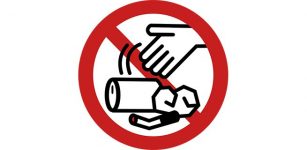What Are The Penalties For Littering in New South Wales

Did you know there is a website now where you can ‘dob in a litterer’?
Cigarette butts littered from car windows can be reported, and fines can be issued by state authorities.
And that is not all, there is even an app available for download, put out by the Environment Protection Authority (EPA) to help you report those who litter from vehicles.
The Herald Sun reported that so far, since January this year, litterbugs in Victoria have been fined $3 million, after being dobbed in to the EPA.
What items can be littered?
And yes, litter does include cigarette butts, which are actually one of the most common items to be disposed of by way of littering.
It also includes just about anything else you can think of, a non exhaustive list provided by the legislation also includes: any solid or liquid domestic or commercial refuse, debris or rubbish such as glass, metal, paper, fabric, wood, food, abandoned vehicles, abandoned vehicle parts, construction or demolition material, garden remnants and clippings, soil, sand, rocks.
The law provides an exception for this: if the custodian of the place in question provided a receptacle for the depositing of litter, you may place your litter in it. Which is a fancy way of saying, if the there is a bin in a public area, it is okay to use it.
The law that applies
Under section 145 the Protection of the Environment Operations Act 1997 (NSW), littering is against the law.
A person who leaves litter in or on a public place, or an open private place faces an on-the-spot fine of $250, or a maximum fine of $2,200 if he or she elects (chooses) to take the matter to court and is found guilty of the offence.
Under section 146E of the Protection of the Environment Operations Act, releasing helium balloons is littering, if you release 20 or more at about the same time.
Aggravated littering covers circumstances where the litter caused or contributed to danger to humans or animals, premises or property, or was reasonably likely to. It also includes lit cigarette butts and syringes.
Aggravated littering could cost you up to $3,300, or $5,500 in the case of a corporation.
Subsection 145(3) of the Act makes clear that a person is not guilty if the litter was:
- placed in a receptacle provided by the custodian of the place for the depositing of litter, and
- in accordance with any conditions specified by the custodian, by means of a notice displayed on or in the vicinity of the receptacle, in relation to the depositing of litter in the receptacle, or
- placed a receptacle containing the litter in the place for the purpose of the litter being removed in the course of a litter removal service provided by the custodian of the place, or
- deposited the litter in the place:
- in response to an invitation contained in a notice published by the custodian of the place, and
- in accordance with any conditions specified in the notice in relation to the depositing of litter in that place, or
- deposited the litter in the place with the express consent of the custodian of the place.
- deposited the litter in the place under an authority conferred by or under this or any other Act or any Commonwealth Act, or
- deposited the litter in accordance with any regulations made for the purposes of this section or in such circumstances as may be prescribed by any regulations made for the purposes of this section.
An Australian Food and Grocery Council study examined the behaviour of litterers and the different ways in which they operate. They found the following littering behaviours:
- Wedging – squeezing a piece of rubbish in between planks on seats or other gaps
- Flagrant flinging – where used materials were thrown into the air
- Inching – a person slowly moves away from their litter
- Foul shooting – where the litterer throws rubbish at the bin and misses
- Undertaking – where litter is buried, often at the beach
- Clean sweeping – arriving at a table or where the previous occupants had left behind rubbish and sweeping all the rubbish onto the ground
- 90%ing – where most of the rubbish is put into the bin but some is left behind or drops to the ground
- Herd behaviour – where people follow the lead of others like going past an empty bin to put rubbish next to an overflowing one.
They found that litter attracts litter – if a place is already covered with litter, others are more likely to litter. So if you drop your rubbish, your actions also make it more likely that other people will litter, too!
Keep Australia beautiful
Littering is a problem because it spoils the beauty of a place. It also has an impact on water quality, can block drainage systems, be dangerous to the public and litter can also be a fire hazard. Last year alone 216 bushfires were started by cigarette butts.
Littering is also costly to the community in terms of cleanup measures – this year the NSW government has committed $20 million to anti-littering programs.
These are all great reasons to stop littering. The Australian Food and Grocery Council study also found that 51% of littering occurred within just eight metres of a bin. It is probably not going to take a lot of effort for your to walk that far. And the next time you are driving and the thought crosses your mind to toss your trash, remember that it could be costly if someone reports you!
Receive all of our articles weekly
Author






